Part 3
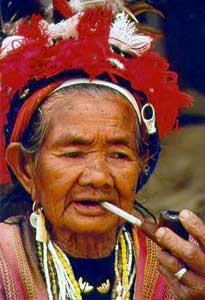
You ask, was there a time when white Moskavi did not breed like rats in grain? My grandmother told me stories of her grandmother, and of a time before earth-breakers and seed sowers filled the land. Now I tell these stories to you.
There was time when the city of Moscow was the only home of the Russian people. But as they hungered for wheat, they also hungered for land. By beating their slaves to death, they built with blood what healthy hands could not: beetle-shaped granaries with troughs of food, and vast bands of breeding families, Moskavi settlers. Like locusts, they swarmed eastward to the fertile lands of the Ivory Bend. They called themselves the Petersburg Migration, and my grandmother's tribe could hardly stay ahead of their hunters and scouts. Wherever the Russians went, the game was killed without regard for age or breeding. They did not care for the future of the beasts.
It was at this time, says the tales, that the throne of Peter discovered the lands of the Indians and their awful gods. Look here, my son. See this white stone? The traders of India call it marble. No, do not touch it! It is beautiful when smoothed at the bottom of a river, but it is death. The Indians rend the belly of the Earth to reach it, and then they carve it from Her bones.
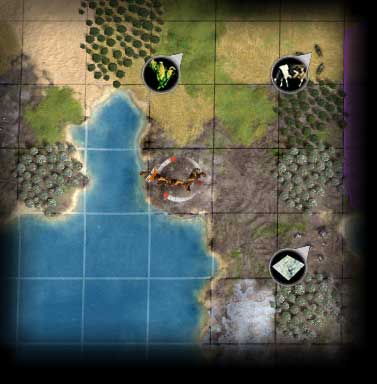
Peter The Great says: Canuck-Errant is brilliant scout. We see Ghandi's belly, yes? He will be ripe target for conquest.
My grandmother's grandmother witnessed the settlement of the new Russian city along the Ivory Bend, and it broke her heart. It is said she died after three days of crying.
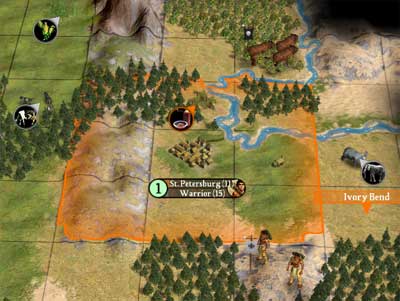
Dmitri Savostin says: It should be obvious from this artist's rendition that the Russian's first settlement was built with the future in mind. Until the city began to produce culture, however, it could only feed itself with the limited resources available on the city's hinterlands. Still, even in these earliest years, everyone knew the city would become one of Russia's most productive military centers.
Soon came the clay-memories. I've seen them myself. The Russians move their hands and make symbols, and the symbols are memories that other symbol-writers can share. As my grandmother said, sometimes a man of the tribe would slight a Moskavi, but rather than forget, the Moskavi would go to the symbol-makers and have the memory set in pottery. Then for years and years, the man could never return because the Moskavi would never forget.
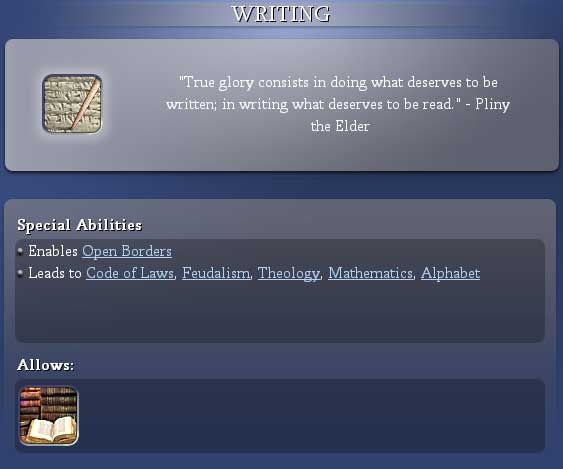
Writing enabled the Russian people to develop libraries and pass down technical knowledge to future generations. It also allowed for the signature of formal treaties, which were vital to the cultural and economic development of the Russian empire.
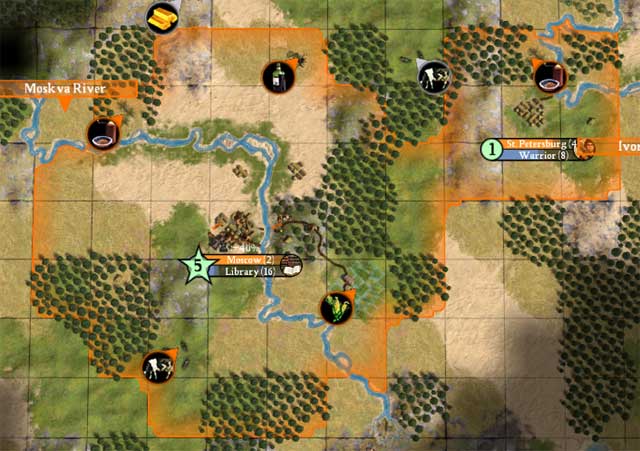
As of 1960 BC, the Russian Empire. This same year, Judaism was founded in a distant land.
In 1880, by the Moskavi calendar, there was a terrible slaughter, and almost half the population was enslaved. If the rumors are true, then the Moskavi used this labor to construct a vault of memories in Moscow, which they called the library. My grandmother told me that corpses could be seen floating face down the Moskva River, and that the water stank of blood and drove the crocodiles into a frenzy.
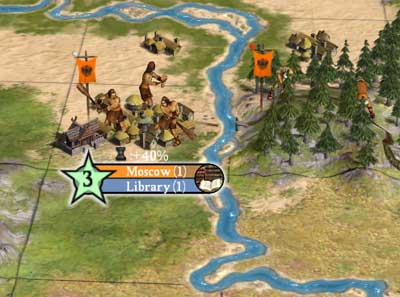
An aside from Zoolooman posted:
The population in Moscow dropped from 6 to 3 in one big whipping. However, the hammer boost was tremendous: it sped up the library's production by 13 turns, and will likely give me enough spare hammers to build a free worker. For those who don't know, slavery allows you to kill points of population in order to create a massive influx of hammers. This "rushes" a unit in production to completion. Of course, using slavery adds one unhappiness to the city for 10 turns, since your citizens remember your cruel oppression.
Furthermore, if a city's unhappiness is greater than its happiness, then subtract happiness from unhappiness to discover the number of population points that will refuse to work. Non-working population points are worthless. Hence, you should whip the population in big groups in order to get the most production with the least amount of unhappiness. Cities which are severely whipped will not grow so fast that they still remember the whipping by the time they've regrown.
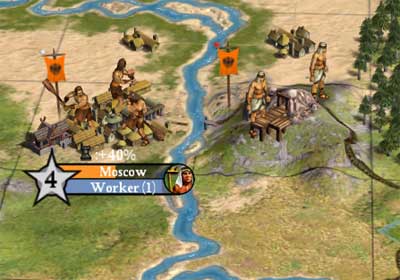
In my mother's years, after the slaves had been worked to death but before I was born, the Moskavi birthed another breeding swarm. My mother told me that the men and women of Moscow were eager to leave the city and settle our lands. And who wouldn't have been? Moscow was crowded and filthy, and there was hardly a day when the wagons wouldn't roll the dead down to the river to dump them downstream. Sometimes, when the sun would anger in the summer, the river would dam with death-engorged corpses, and the women of my tribe would become ill from drinking the thick runoff.Another aside from Zoolooman posted:
Note that in this picture, the hill no longer has a forest, and instead has a mine. I timed my whip so that the turn after the library finished, the workers would finish chopping the forest and constructing the mine. The chopped forest gives me +20 hammers in Moscow, and the mine will produce 3 hammers on every turn it's worked. Hence, using the overflow of hammers from the slavery and the hammers from the forest, my second worker is produced in one turn.
Workers and settlers are built with both food and hammers, so while building them, the city will not grow. By speeding through the production of this worker, I avoid stunting the city's growth, and ultimately squeeze more production out of my city and my terrain.
In the same year, I hear that the men of St. Petersburg joined their Moscow brothers in practicing slavery and bloodshed. Half their population was killed in order to construct granaries for Peter, their grain-fattened king.
But the worst part, oh, son, was what they did only twenty years ago, just after I gave birth to you, my youngest, my treasure. I saw a Moscavi enter our village with a piece of metal unlike any other. It was long and straight, obviously a weapon of incredible craftsmanship. The men of the village approached him to admire it, and with a smile, he whipped it through the air past a nearby child. The stroke was smooth, and I thought that the man had merely frightened the boy by striking at air, until I saw the boy's belly empty itself through his navel and pile onto the ground. Several of the men tried to kill the Moscavi man, but after his blows split their bronze axes, they retreated.
The Russians had discovered a way to melt and forge the metal we call iron. That weapon was the first iron sword.
So far...
I've discovered Writing and Ironworking, and I've built a granary in both cities. I've also built a library in Moscow, and I've begun to research the Alphabet. I have open borders with nobody, yet, though I'm thinking I'll sign with Ghandi, since Isabella (and Buddhism) appear to be nowhere nearby.
Isabella founded Judaism, since she adopted Organized Religion.
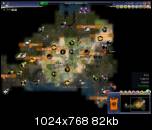
If you'll look on the map, you'll see my current city positions and the positions of resources. There is lots of iron to settle with my next settler: where should I settle? You decide!
Also, please name: my third city, my new worker, and what will be my first swordsman.
If you want to know anything else, just ask for the information. I'll provide it. If you want me to wage classic warfare on a neighbor (*cough*, Ghandi, *cough*), just say as much.

EDIT: Important info: I've discovered the Chinese, Indian, and German homelands. The Indians are in the South East, the Chinese slightly North East, and the Germans so deep to the West that they aren't even on the map I posted.